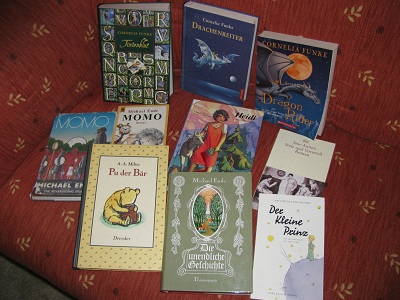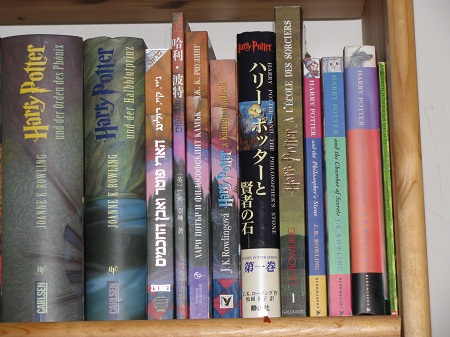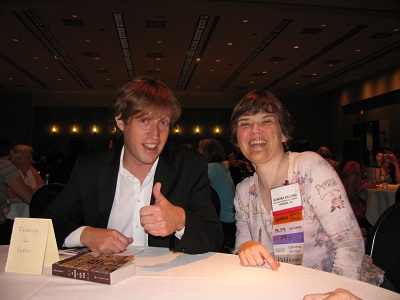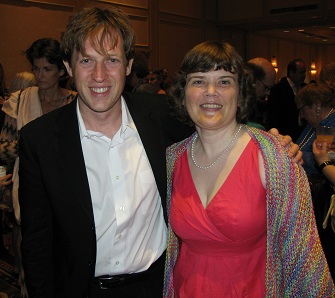Review of The Order of Odd-Fish, by James Kennedy
by James Kennedy
Laurel-Leaf Books, 2008. 403 pages.
Starred Review
2011 Sonderbooks Standout: #7, Fantasy for Teens
It’s high time I reviewed this book. I first decided I had to read it when I met the author, James Kennedy, at the 2010 ALA Annual Conference when I attended the YA Author Coffee Klatch. It sounded very much like a book my sons would enjoy, since they are big fans of Douglas Adams, so I purchased a copy to give my younger son for his upcoming 16th birthday. (And the next March, I sent a copy to my older son for his 23rd birthday.)
Then 2011 ALA Annual Conference was coming up, and I saw James Kennedy’s name on the schedule. I still hadn’t read his book! So I tucked my son’s copy into my carry-on and began reading it on the plane. Sure enough, I saw James at the Newbery Banquet, and it was fun to be able to tell him where I was in the book and talk about it. On the way home from New Orleans, I tweeted my progress, and that was fun, too. I was impressed with how he pulled off an excellent ending, which I was wondering about along the way.
Then I could have sworn I had reviewed the book when I finally caught up on writing reviews last Fall. But it turned out it got out of my to-be-reviewed pile when my son decided to finally read it and took it to his room.
I highly recommend the book for fans of Douglas Adams or Jasper Fforde. Only, Douglas Adams and Jasper Fforde have adult protagonists (not that that deters teen readers), but The Order of Odd-Fish has a teen protagonist. So this might be a good choice for teens whom you suspect will enjoy Douglas Adams or Jasper Fforde.
The first word that comes to mind every time I attempt to describe The Order of Odd-Fish is “bizarre.” Like the Hitchhiker’s Guide books, it’s got its own twisted and very funny logic that plays on traditional fantasy tropes.
Take our protagonist, Jo Larouche. She’s got a prophecy about her and is a “chosen” child, but it’s quite different than the Chosen One in more traditional fantasy novels. Make that very different.
Probably the simplest way to capture the spirit of this novel is to give you the description of Jo’s Aunt Lily, including the part where she found Jo:
“The story of Lily Larouche was well known.
“She had been a famous actress long ago, with a reputation for strange behavior. The tabloids knew she was good for at least one sensational rumour per week:
“LILY LAROUCHE THROWS RODENT AT STARLET
“LILY LAROUCHE ARRESTED AGAIN FOR RECKLESS HOT-AIR BALLOONING
“HEARTSICK PRESIDENT SHAVES OFF OWN EYEBROWS IN DESPERATE BID TO WIN LILY LAROUCHE’S LOVE
“The rumors usually proved true. Lily Larouche had hurled a live rat at another actress who had insulted her. For many years, her hot-air balloon had been a nuisance over Los Angeles, regularly disrupting air traffic. And Lily Larouche still had on her desk, floating in a jar of formaldehyde, the lonely eyebrows of President Eisenhower.
“Then came the most mysterious headline:
“LILY LAROUCHE DISAPPEARS!
“She had vanished. Her notorious ruby palace, which for years had hosted the wildest parties in Hollywood, was empty. Nobody knew where she had gone.
“Then, forty years later, there was a new headline:
“LILY LAROUCHE RETURNS! (WITH A “DANGEROUS” COMPANION)
“Lily Larouche had awakened in her dusty bed, in her ruby palace. But she had no idea how she had got there. And she had no idea what she had been doing for the past forty years.
“Then she heard a distant crying. She followed the sound to her laundry room — and there, inside the washing machine, she found a baby.
“She also found a note:
“This is Jo. Please take care of her.
But beware.
This is a DANGEROUS baby.”
As the book opens, Jo Larouche is now thirteen years old. Unbeknownst to her, she is about to travel to Eldritch City, meet the Order of Odd-Fish, see Aunt Lily regain her memory, and learn why she herself is so DANGEROUS.
And the story has only begun to be bizarre.
I’ll definitely be blogging more about this book. When James Kennedy noted that his book had been translated into German with the title Der Orden der Seltsamer Sonderlinge, I was so delighted, he promised me a copy. As all my readers surely know by now, Sonder is a German prefix meaning “special.” What I don’t proclaim so frequently is that I’d already known that a Sonderling is someone who’s “special” in the less flattering sense of the term — more recent translations include “nerd” and, well, “odd-fish.” But however you want to look at it, I maintain this proves that The Order of Odd-fish is a Sonderbook indeed! James Kennedy did send me a copy of the German edition, and I’m planning to blog about reading it — as soon as I get caught up on posting Sonderbooks Standouts.
Meanwhile, this is definitely a great choice for people who enjoy books that are bizarre, clever, and very funny.
Find this review on Sonderbooks at: www.sonderbooks.com/Teens/order_of_odd_fish.html
Disclosure: I am an Amazon Affiliate, and will earn a small percentage if you order a book on Amazon after clicking through from my site.
Source: This review is based on a book I purchased at ALA Annual Conference for my son, and had signed by the author.










